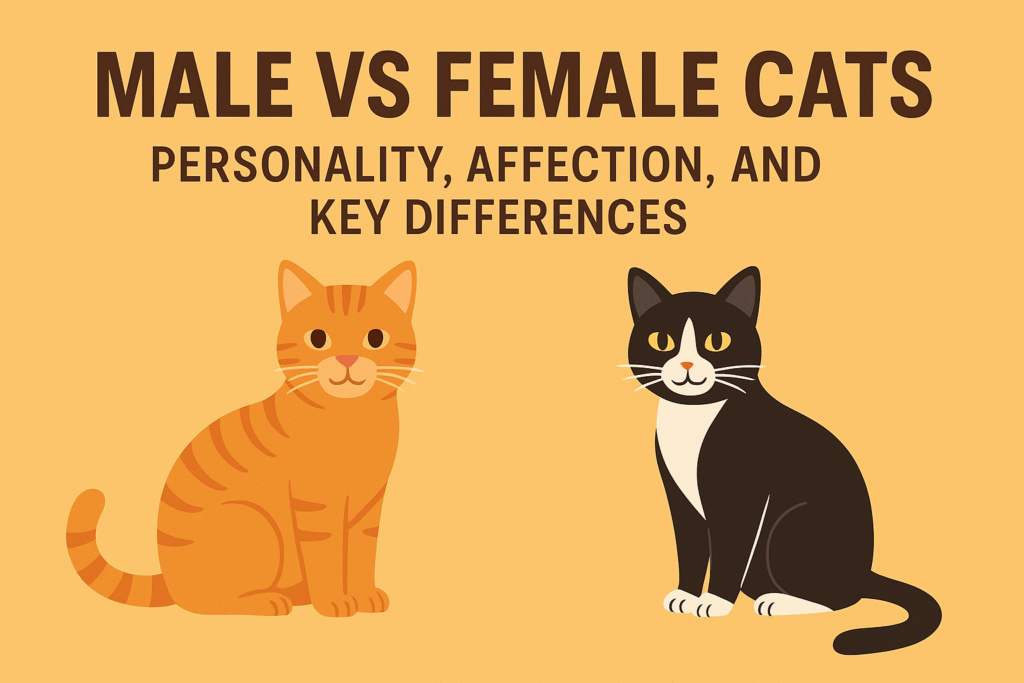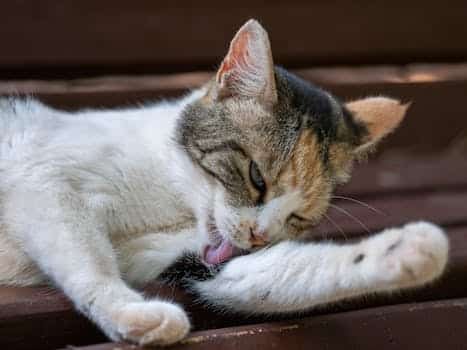Post Disclaimer
Catopedea shares information for educational and general interest purposes only. Our content is not a substitute for professional veterinary advice, diagnosis, or treatment. Always consult a licensed veterinarian for concerns about your cat’s health, diet, or behavior.
For as long as people have welcomed cats into their homes, the question has been asked: should you get a male cat or a female cat. New cat parents often wonder if one gender is friendlier, more affectionate, or easier to live with. Some believe male cats are big softies while others argue that females are independent queens. The truth is that both male and female cats can make wonderful companions, but they do show some general differences that can help you decide which is the best fit for your home.
In this complete guide we will look at the traits of male and female cats, compare their affection levels, highlight what to expect from kittens, and help you decide which type of cat might match your lifestyle.
Male vs Female Cats: Physical and Personality Differences

Male cats are often larger and more muscular than females. On average, males can weigh two to three pounds more than females of the same breed. Their faces also tend to be broader and more rounded. These physical differences are subtle but noticeable when you live with both genders.
When it comes to personality, male cats are often described as more sociable and affectionate, especially once neutered. They may seek out human attention, follow you around the house, and flop on their backs for belly rubs. Females, on the other hand, are sometimes seen as more independent. They often pick one favorite person to bond with deeply while being polite but less attached to others in the household.
It is important to remember that these differences are general patterns rather than strict rules. Each cat has its own personality shaped by genetics, environment, and socialization.
Are Male Cats More Affectionate
One of the most common beliefs is that male cats are more affectionate than females. Many cat owners report that their male cats love to cuddle, sit on laps, and rub against visitors. This tendency is especially true for neutered males, since neutering reduces roaming instincts and makes them more focused on companionship.
Male cats also tend to be more playful well into adulthood. They often enjoy interactive toys, chasing games, and wrestling. This playful energy, combined with a relaxed attitude, can make them seem like big friendly companions who thrive on attention.
Why Male Cats Often Seem Cuddlier
The reason male cats are often described as cuddlier comes down to behavior shaped by hormones. Intact males are more likely to roam and mark territory, but once neutered, they redirect their energy toward their human family. They often become very people-oriented, greeting their owners at the door or curling up on the couch for long snuggles.
Another reason males may seem more affectionate is their willingness to bond with multiple people in the household. Unlike some female cats who prefer one person, males often spread their affection around. This makes them excellent family pets.
Are Female Cats More Affectionate
Although male cats often have the reputation of being more affectionate, female cats should not be overlooked. Many females form incredibly strong bonds with their chosen person. They may be less interested in strangers but will show deep loyalty and love toward their favorite human.
Female cats are often highly attentive and may follow you from room to room, quietly observing. Their affection can be more subtle but equally powerful. A female cat that chooses to curl up beside you or groom your hair is expressing deep trust.
Females also tend to be more agile and athletic. They may climb more often, jump to higher places, and enjoy games that challenge their hunting skills.
Male vs Female Kittens: What to Expect
When deciding between a male kitten and a female kitten, the differences may be less obvious. Kittens are naturally curious, playful, and affectionate regardless of gender. However, some tendencies may show early.
Male kittens may wrestle more and play rougher with their littermates. They might also be quicker to approach people and seek interaction. Female kittens can be just as playful but sometimes display more cautious or reserved behavior, especially in new environments.
As kittens grow into adults, these patterns can become clearer. A male kitten that loves attention often grows into a very affectionate cat, while a female kitten that observes quietly may grow into a loyal but selective companion.
Male Cat Traits vs Female Cat Traits
Here is a simple comparison of the traits often noticed in male and female cats:
| Trait | Male Cats | Female Cats |
| Size | Larger, more muscular | Smaller, more delicate |
| Affection | Generally more outgoing and cuddly | Strong bond with one person, selective affection |
| Playfulness | Very playful, sometimes rough | Playful but agile and cautious |
| Socialization | Friendlier with strangers, bonds with multiple people | Loyal to one or two people |
| Energy | High energy, playful into adulthood | Agile, athletic, sometimes more reserved |
| Independence | Moderate | Often more independent |
This comparison shows that both genders bring wonderful qualities to a home.
Should You Get a Male or Female Cat
Choosing between a male or female cat depends more on your lifestyle than on the cat’s gender. If you are looking for a social cat that enjoys attention from multiple people, a male cat may be a better fit. If you prefer a cat that forms a deep one-on-one connection, a female may be perfect.
Families with children often do well with male cats because of their playful and tolerant nature. Single owners or those who want a quieter bond may enjoy the companionship of a female cat.
It is also worth noting that spaying and neutering greatly influence personality. Intact cats of both genders can display unwanted behaviors such as spraying or aggression. Once fixed, they often become calmer, more affectionate, and easier to live with.
Male vs Female Cats as Indoor Pets
When it comes to indoor living, both male and female cats can thrive. Male cats may be more active and playful indoors, needing more toys and enrichment. Female cats may be more content to lounge in sunny spots and observe the world quietly.
Both genders benefit from scratching posts, climbing trees, and interactive playtime. The key is not the gender but how much stimulation and love you provide.
Do Male Cats Get Along with Female Cats
Many people wonder whether male and female cats get along better than two cats of the same gender. In many cases, a male and female pair works well because their personalities balance each other. A playful male can bring out the fun side of a quieter female, while a female can provide calm stability to an energetic male.
Introducing cats to each other slowly and respectfully is more important than their gender. Proper introductions, patience, and giving each cat their own space usually lead to peaceful coexistence.
Frequently Asked Questions
Are male cats bigger than female cats
Yes, male cats are usually larger and heavier than females of the same breed, although the difference is not always dramatic.
Do male cats live longer than females
On average, female cats live slightly longer than males, but both can live long healthy lives with good care.
Do male cats spray more than females
Intact male cats are more likely to spray, but neutering usually reduces this behavior. Females can spray too, though it is less common.
Which is better for first time cat owners, a male or female
Both genders can make wonderful pets. Males may be more outgoing, which can help new owners, while females may be easier for those who prefer a quieter companion.
Are male cats more aggressive than females
Not necessarily. Aggression depends on the individual cat and whether they are spayed or neutered. Many neutered males are gentle and loving.
Conclusion
The debate over whether male cats or female cats make better pets has no single answer. Both bring unique qualities to a household. Male cats are often bigger, more playful, and openly affectionate, while female cats are agile, loyal, and form deep connections with their chosen person.
When choosing between a male or female cat, the best decision is to focus on personality, upbringing, and how well the cat matches your lifestyle. If you’d like more insights into cat behavior and care, you can explore our detailed guides on Catopedea. Whether you adopt a cuddly boy or a graceful girl, the love and joy of sharing your life with a cat will always outweigh the question of gender.



Pingback: Male Cat Behavior After Neutering: Week-by-Week Guide - catopedea.com